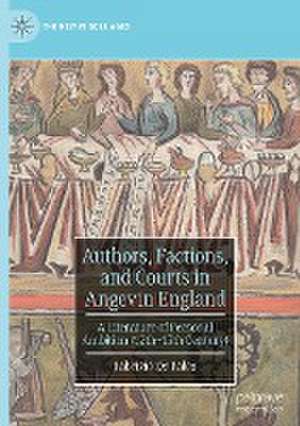Authors, Factions, and Courts in Angevin England: A Literature of Personal Ambition (12th–13th Century): The New Middle Ages
Autor Fabrizio De Falcoen Limba Engleză Hardback – 21 dec 2023
Din seria The New Middle Ages
- 20%
 Preț: 690.01 lei
Preț: 690.01 lei - 17%
 Preț: 457.58 lei
Preț: 457.58 lei - 18%
 Preț: 782.42 lei
Preț: 782.42 lei - 15%
 Preț: 636.80 lei
Preț: 636.80 lei - 8%
 Preț: 537.27 lei
Preț: 537.27 lei - 20%
 Preț: 566.94 lei
Preț: 566.94 lei - 9%
 Preț: 626.77 lei
Preț: 626.77 lei - 20%
 Preț: 629.10 lei
Preț: 629.10 lei -
 Preț: 347.97 lei
Preț: 347.97 lei - 8%
 Preț: 563.62 lei
Preț: 563.62 lei - 9%
 Preț: 626.68 lei
Preț: 626.68 lei - 15%
 Preț: 524.70 lei
Preț: 524.70 lei - 8%
 Preț: 459.88 lei
Preț: 459.88 lei -
 Preț: 303.51 lei
Preț: 303.51 lei -
 Preț: 389.70 lei
Preț: 389.70 lei -
 Preț: 390.63 lei
Preț: 390.63 lei -
 Preț: 383.93 lei
Preț: 383.93 lei -
 Preț: 385.62 lei
Preț: 385.62 lei -
 Preț: 390.25 lei
Preț: 390.25 lei -
 Preț: 385.25 lei
Preț: 385.25 lei - 5%
 Preț: 712.81 lei
Preț: 712.81 lei - 15%
 Preț: 640.06 lei
Preț: 640.06 lei -
 Preț: 398.15 lei
Preț: 398.15 lei -
 Preț: 393.35 lei
Preț: 393.35 lei - 18%
 Preț: 725.13 lei
Preț: 725.13 lei - 18%
 Preț: 724.17 lei
Preț: 724.17 lei -
 Preț: 388.90 lei
Preț: 388.90 lei - 15%
 Preț: 698.30 lei
Preț: 698.30 lei -
 Preț: 386.39 lei
Preț: 386.39 lei -
 Preț: 387.38 lei
Preț: 387.38 lei -
 Preț: 384.48 lei
Preț: 384.48 lei - 18%
 Preț: 726.69 lei
Preț: 726.69 lei -
 Preț: 385.08 lei
Preț: 385.08 lei - 15%
 Preț: 639.14 lei
Preț: 639.14 lei -
 Preț: 388.72 lei
Preț: 388.72 lei -
 Preț: 389.11 lei
Preț: 389.11 lei -
 Preț: 387.20 lei
Preț: 387.20 lei - 15%
 Preț: 697.97 lei
Preț: 697.97 lei - 15%
 Preț: 640.24 lei
Preț: 640.24 lei - 15%
 Preț: 499.92 lei
Preț: 499.92 lei -
 Preț: 388.72 lei
Preț: 388.72 lei -
 Preț: 387.96 lei
Preț: 387.96 lei - 15%
 Preț: 579.20 lei
Preț: 579.20 lei -
 Preț: 391.40 lei
Preț: 391.40 lei - 15%
 Preț: 640.37 lei
Preț: 640.37 lei - 15%
 Preț: 641.71 lei
Preț: 641.71 lei -
 Preț: 384.70 lei
Preț: 384.70 lei
Preț: 629.01 lei
Preț vechi: 786.26 lei
-20% Nou
Puncte Express: 944
Preț estimativ în valută:
120.36€ • 126.12$ • 99.50£
120.36€ • 126.12$ • 99.50£
Carte disponibilă
Livrare economică 22 martie-05 aprilie
Livrare express 08-14 martie pentru 31.41 lei
Preluare comenzi: 021 569.72.76
Specificații
ISBN-13: 9783031433511
ISBN-10: 3031433513
Pagini: 270
Ilustrații: XI, 270 p. 5 illus., 3 illus. in color.
Dimensiuni: 148 x 210 x 23 mm
Greutate: 0.49 kg
Ediția:1st ed. 2023
Editura: Springer Nature Switzerland
Colecția Palgrave Macmillan
Seria The New Middle Ages
Locul publicării:Cham, Switzerland
ISBN-10: 3031433513
Pagini: 270
Ilustrații: XI, 270 p. 5 illus., 3 illus. in color.
Dimensiuni: 148 x 210 x 23 mm
Greutate: 0.49 kg
Ediția:1st ed. 2023
Editura: Springer Nature Switzerland
Colecția Palgrave Macmillan
Seria The New Middle Ages
Locul publicării:Cham, Switzerland
Cuprins
Chapter 1 Introduction. But What is the Point of Courtly Writing?.- Part 1 The Hydra: The Court’s Body and Its Wandering Heads.- Chapter 2 Re-thinking Literature at the English Royal Court, Its Protagonists and Contexts.- Chapter 3 Starting at the Bottom: The Authors.- Part 2 The Messages Between the Lines. A Political Reading of Courtly Texts.- Chapter 4 An Accurate Curriculum: Walter Map’s De Nugis Curialium.- Chapter 5 A Family Business: Gerald of Wales’ Topographia Hibernica.- Part 3 The Real World is Here. The Role of Courtly Literature between Factions and Crisis.- Chapter 6 Surviving in the Upside-Down. Henry II’s Courtiers under Richard I’s Reign (1189-1199).- Chapter 7 Moving Text into Action. Local Careerism and International Crisis.- Conclusion: Contingently Situated Literature and Courts Dynamics.
Notă biografică
Fabrizio De Falco is Research Fellow and Adjunct Professor of Medieval History at the University of Bologna, Italy. He is a medievalist with a strong interest in cultural studies and their interconnection with politics. His work focuses on the use of literary themes and texts to promote personal ambitions and political aims, more specifically the literary production at the Plantagenet court.
Textul de pe ultima copertă
Authors, Factions, and Courts in Angevin England: A Literature of Personal Ambition (12th-13th Century) advances a model for historical study of courtly literature by foregrounding the personal aims, networks, and careers as the impetus for much of the period’s literature. The book takes two authors as case studies – Gerald of Wales and Walter Map – to show how authors not only built their own stories but also used popular narratives and the tools of propaganda to achieve their own, personal goals. The purpose of this study is to overturn the top-down model of political patronage, in which patrons – and particularly royal patrons – set the cultural agenda and dictate literary tastes. Rather, Fabrizio De Falco argues that authors were often representative of many different interests expressed by local groups. To pursue those interests, they targeted specific political factions in the changeable political scenario of Angevin England. Their texts reveal a polycentric view ofcultural production and its reception. The study aims to model a heuristic process which is applicable to other courtly texts besides the chosen case-studies.Fabrizio De Falco is Research Fellow and Adjunct Professor of Medieval History at the University of Bologna, Italy. He is a medievalist with a strong interest in cultural studies and their interconnection with politics. His work focuses on the use of literary themes and texts to promote personal ambitions and political aims, more specifically the literary production at the Plantagenet court.
Caracteristici
Advances the courtier as a hybrid figure Proposes new perspectives on courtly literature Reveals twelfth century writers’ objectives and networks
